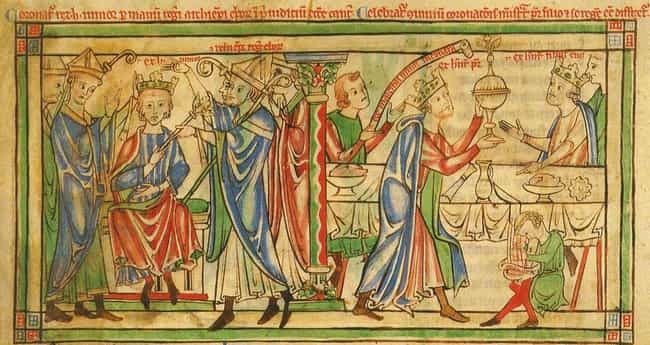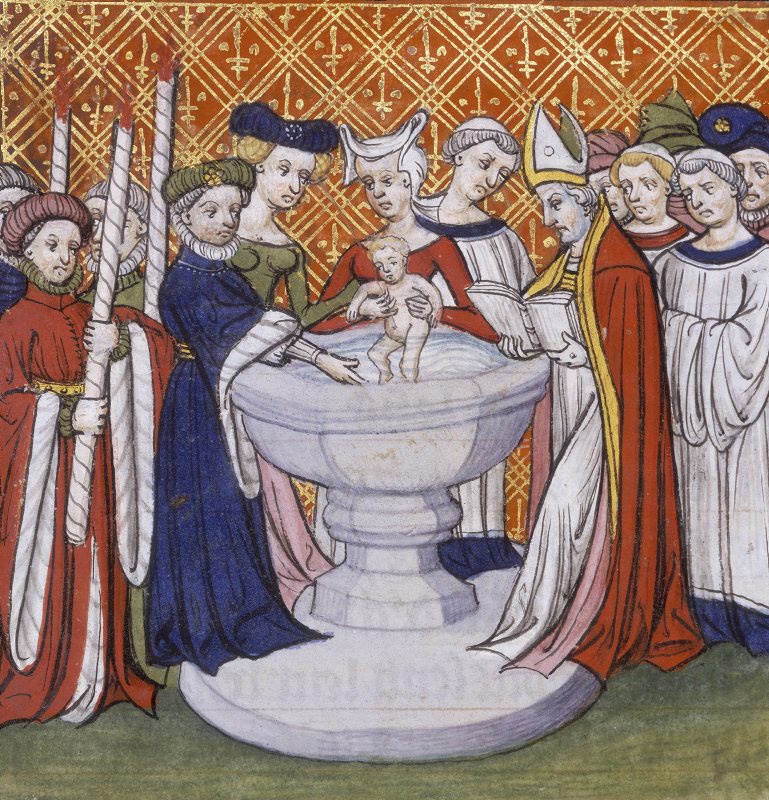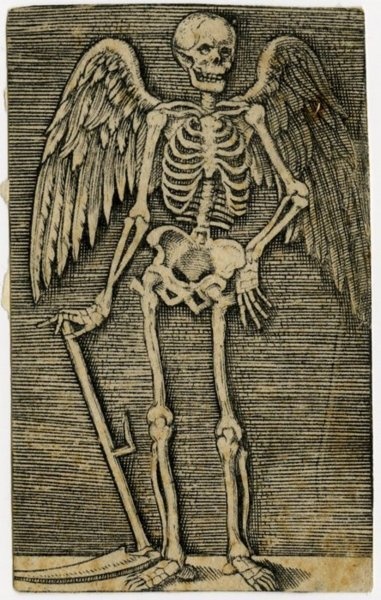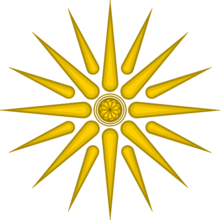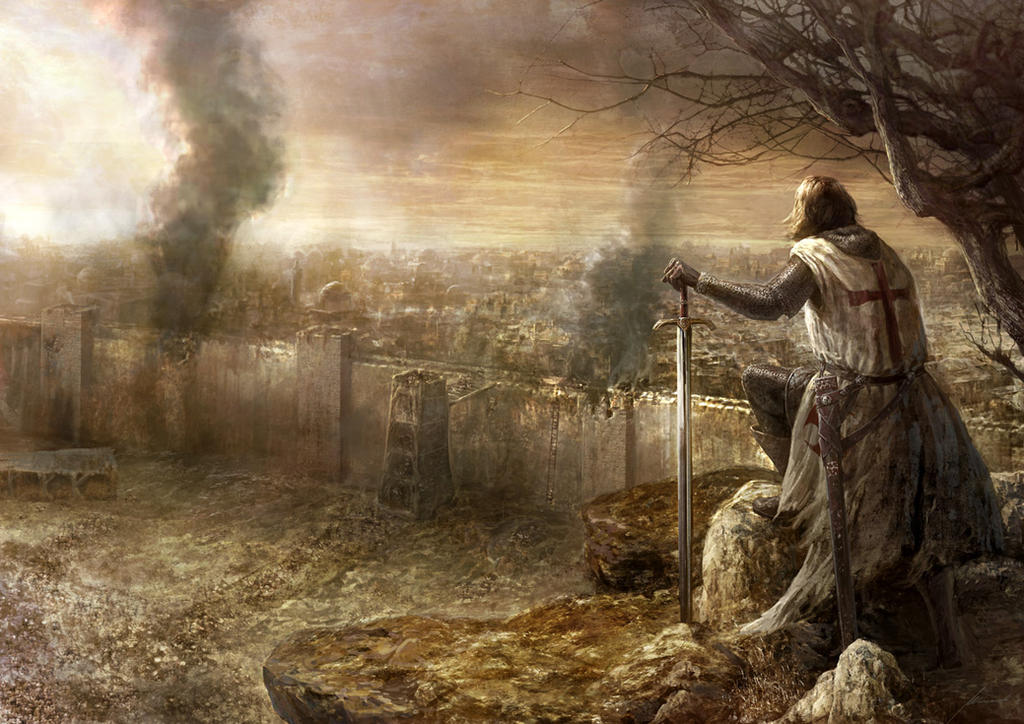1224 - 1227
Episode Seven
_________________________________
UNDER SIEGE
_____________________
"Fourth Crusade"
"Schism Bloodshed"
"First Roman Total War"
_________________________________
The Shia Jihad had just been declared on Christmas. As the entire Mediterranean raised their arms against Constantinople, the Roman Themas were even more resolute: If they were defeated, there would be no Empire the next day. Their way of life, culture, religion, all was threatened. For the first time in a century, Rome would fight without allies, alone against the rising tide of enemies.
The deployment of troops was quick and precise. Any mistake could start an spiral set of events that would lead to total destruction. This was, truly, the first "total war" the Empire fought using all resources at hand, from people to geography.
Even independent local militias rose up to face the invaders, knowing that this war needed them all. This wasn't a fight for the desires of an Emperor, but for their families and their towns. The Crusader forces were zealous savages, as the Holy Land learnt the hard way after the First Crusade, and no one wanted that for their villages.
Then, a miracle happened.
Somehow, King Arpad of Greater Hungary had been defeated on his invasion of Bavaria. But, instead of going back home to lick his wounds, he quickly sent an offer of help against the Shia Jihad. Sure, this meant that Hungary was not going to clash with the forces of Catholic Europe, but at this point any help was appreciated.
The first great battle of the Total War would take place in the Straits of Otranto, at the coasts of Avlonas. Lead by the Prince-Bishop of Benevento, almost twenty thousand men took arms and tried to cross the straits by their own means, without any help from the Republics. Taking defensive positions along the coast, the much minor Roman Force could do nothing else but wait...
But as reinforcements from Italy kept coming, making the battle last for days, two consecutive victores were achieved on the opposite sides of the Empire. Fighting alongside the militas formed at Belgrade, the northern defenses stood firm against the Croatian route, sending them back and preparing for the next wave. And, in Syria, the almosf half of Outremer forces that dared to invade their own ally was destroyed, forcing them back to the deserts.
And after the fifth day of crusader waves against Avlona, specifically near Kanine, the Imperial defenders had managed a resounding success at expeling back to Italy the forces of Benevento, losing few more than nine hundred men to their almost ten thousand: Ten Latins lifes per one Roman.
But every victory doesn't last long. They still had to hold their post, bury their dead, and wait for the next assault, which would come much sooner than expected. And, back near Constantinople, a bold emir had advanced to the Bosphorus, maybe thinking that Byzantium would be in state of chaos. It wasn't.
Even when good news were arriving, a proof that the war plans of the council were correct, a devastating letter arrived to Constantinople: Protostator Gennadios had died, not in battle, but Measles, in a very unlucky outbreak in Sicily. Exarch and Despot Makarios II Palaiologos was besieging Rome while the note was written, trying to accomplish the mission assigned, but without the military genious of Gennadios, all became much more difficult.
The key of survival was Rome. Without it, there wasn't much but to fight the Crusaders at home.
As the plans on the West seemed unadequate to the new reality, Belisarios saw how his trap on Constantinople was luring the greater armies to the capital. This had to work, not just to get another victory, but to show the Empire that victory was attainable.
More reports, abandoned thanks to the state of war, started to accumulate on Manrike's desk. Worrying news came from the East, but nothing could preoccupy the Emperor more than the war he was fighting on.
A big army Shia army had landed near Jerusalem, and the Antiochean Thema had to quickly race to face it and avoid letting the infidel hordes to flood the countryside of Syria. It would be a difficult battle, but the Romans had stationated their troops on mountains, controlling the terrain and using it to their advantage. They had to hold the East until the Hungarians arrive, giving them the possibility of go back West and reinforce the capital. But, as they were willing to fight without any support, the Exarch of Antioch order them to retreat back to the capital. He wasn't going to risk his entire army without guarantees.
-While weakened, the Fatimids were no joke-
The Antiochian strategy also had an unexpected side effect: confident, their leaders seemed to have brought less water than needed, an so their numbers dwindled, but with reinforcements on the horizon they still surpased Roman numbers.
Even more good news came from Avlonas, where the local army still managed to repelar much bigger armies. The Adriatic Thema were slowing turning in legend with their unrelenting defense of the Empire, with stories of their bravery and sacrifice traleving from Belgrade to Tripoli.
Meanwhile, in Rome, things seemed to be going much better than expected. After getting excommunicated by the Pope for such "Crusade", the rest of Western Europe didn't really pay attention to what was happening on the Papal States. Few even thought that the Romans would even dare to attack the heart of Catholicism while being invaded... but they did.
Of course, this was but one of the battles Despot Makarios would have to fight but, for now, he had time before the Crusaders could react.
And while Rome was being taken, Belisarios' trap became reality. Ten of thousands of Crusaders were camping near the capital, preparing the siege. He just had to wait some days for reinforcements... if they even arrived.
Finally, the Hungarians had arrived to the Levant, and the Thema Antiocheia united forces with King Arpad. Quickly, both forces pursuited the invading Shia, locking them into battle with even more Hungarian troops incoming. Victory was assured that day.
Luckily for Belisarios, his trap was a resounding success: Latins from all Europe were gathering outside the walls of Constantinople, with their giganteous fleet cutting off the capital from her Empire. Trebuchet were already aiming to the city, with some succesful tests on the southern section of the Theodosian Walls. They have been hearing about the complications over the northern and western land routes, and how the Roman armies had hold their positions without much problems. While that sounded bad for the crusade, the Latins on Constantinople understanded it as the Empire focusing on its borders, leaving the Queen of Cities free for the taking.

That day Belisarios had to bet the destiny of the Roman Soul: The Sacking of Rome, in 410 AD, was a sign of the Western Empire's demise. If something like that could happen to Constantinople, then the days of Eastern Rome would be counted. This could not happen under his rule, he couldn't allow it... but still, he needed this; The Empire needed this. It was the only way to destroy all coordination, to scatter their leaders, and finally win this dreadful war.
Only by offering his heart to the enemy, Belisarios could take theirs.
________________________________________
THE SIEGE OF CONSTANTINOPLE
________________________________________
The first hits made by the trebuchet projectiles were felt on April 12, 1226. After some weeks of minor battles on Thrace, the Imperial Army had vanished, and now almost a hundred thousand men camped outside Constantinople. The Italian ships, unable to break through the chain that closed the Golden Horn, maintained their positions around the coastal walls, not getting too close until the general assault began. Three flags waved over the ships' masts: The Republics of Pisa, Genoa, and Venice, a sight that the citizens of Constantinople would hardly forget.
The Theodosian Walls were fully manned by soldiers and conscripts, as the defense of the city was vital. The red and purple flags of the Empire stood high as boulders started to fly over the defender's heads, with only half of the projectiles actually hitting the walls. The rest fell before the moats, or going beyond, destroying houses and ruining some of the inner farms.
Without the Basileus to lead the city's defenses, the populace was paralized. While the city guard kept order in the streets, inside their houses every citizen was thinking if they would survive the next day; after all, had anyone ever mustered an army so big before to siege only one city? Whatever supplies the Crusaders might have, they weren't going to last, and the city would come next.
What was worse than zealous, barbaric Crusaders? Surely, starving crusaders was not nice mental image, and every family inside the walls feared that such foes would end up plundering the city to the ground. Soon, after few days, conflict started to brew between the guard and the populace, demanding a way out of the city, like boats to escape through the Golden Horn. This was impossible, the guard said, as they would be massacred by the crusaders as the civilians dared to put one feet outside the walls.
A week after, and with more trebuchets firing at the gates, the city was about to explode. Half a million souls
-making Constantinople the biggest city in Europe, and maybe the world-, desperate to run away from an army about one fifth of their numbers, started to physically clash with the guard. The Queen of Cities was about to have a civil uprising in the middle of a siege, and not because of food scarcity, but fear.
Then, fire would come from the darkening afternoon sky: gigantic boulders set on flames, coordinated to fire at the same time, started to violently attack the city. That wasn't all; new projectiles, lesser in size but more on numbers, started to hit the coastal towers. Every conflict between civilians and the guard stopped with a single gasp across Constantinople.
The assault had begun.
-Made by Callmevargo-
As fire started to propagate through the roofs and the guard tried to control it before it could engulf entire districts, the citizens fell into chaos. Imagining swarms of Latins striking at the walls, with unending hunger of blood and bread, fathers and mothers hold their children hands as they started marching to the northern harbours, those protected by the chain that stretched from Constantinople to Galata. Soon the streets were flooded by desperate people, hitting themselves as they tried to escape the seemingly inevitable demise of the Empire.
The ininterrupted onslaught was heard over all the city. Screams, buildings crumbling, and the sound of swords and pikes clashing with each other did nothing but to increase the chaos. Even closer to the city core was the attack on the south, where Venetian ships were coordinated the Republican effort to take the outer walls and divide the attention of the defenders. Ships crashing against the stone and their floating siege towers could be seen from the tallest buildings of Constantinople, something that the guard had no way to avoid. Rumours of the walls beign breached and its troops surpassed by Catholic savages easily spread over the people, who started running without direction and stepping over the poor fools that were thrown into the ground.
But then, an strage and inexplicable image stopped all the civilian movement. Marching down from the Palace district, with Hagia Sophia at her back, Basilissa Eudokia lead the Great Palace's garrison
-the Noumeroi- to the outer walls of the city. Wearing full armour while also keeping her majesty untouched, the Empress opened her way through the desperate Romans. Her sight, so calmed and yet so determined while being closely followed by a portion of the Varangian Guard, made the populace open at her.
Then, feeling thousands of eyes over her, she raised the right hand, closing it in a fist.
After all, there was an Emperor leading the city at its darkest hour.
Basilissa Eudokia Komnenos.
-Made by Gambargin-
The sheer number of attackers was frightening. Uncountable ladders and siege towers could be seen approaching and assaulting the walls, as even more boulders were indiscriminately being fired while Crusaders were climbing, many times dying because of friendly fire. As days had passed, and Italian engineers landed on the Latin camps, their trebuchets had dangerously increased their accurency. Many towers were crumbling after repeated hits of flaming rocks, dispersing defenders for a moment and opening windows of time to unleash concentrated attacks on those zones.
Heavily damaged, the Theodosian Walls still stood against the enemy, has they had done before for centuries. While one wall was breached, another two defensive lines remained to hold the ground. Only one spark was enough to set ablaze the Roman banners, leaving uncountable golden eagles burning at the eyes of the Crusaders, who took it as a sign of unavoidable victory. The City of Constantine was at their grasp.
-One of the biggest armies of their time, the Fourth Crusade's forces were savage and impulsive-
The fight continued for days, only the nights giving relative rest to the defenders as the trebuchets continued firing, not caring if they hit the walls or the city buildings. Empress Eudokia constantly surpervised the troops on the superior wall, visiting the wounded and relieving commanders if they needed rest. Feeling her presence, the entire city began to calm down a cooperate with the guard, helping putting down fires and opening the roads for the soldiers. While the Basilissa never was force to pull out her sword at the enemy, soon the populace started to call her the "Fearless" Empress, as she stood over the walls even when arrows and rocks flew over her head, valiantly facing the enemy at the side of her people. Truly, she had Imperial blood on her veins, even when the Komnenos occupied the throne briefly.
-With 17 martial points, she could perfectly be one of my commanders-
With their attention focused on the walls, the Latins never thought possible to be attacked from the rear. The never ending shouting and the constant fall of projectiles against the walls distracted the zealous Catholics from the heavy charge that was coming from Thrake. At first it was just a small tremble, followed by dust on the horizon. After that, the flying banners of red, yellow and purple made a blurred line over what seemed to be an stampede.
Once again, the charge of the cataphracts would save a city.
-Made by
Proxygreen-
By the time that the Italians realized the war cry wasn't theirs, it was too late: Belisarios' forces, lead personally by him, had already reached the camps. The bells of Constantinople, with its churches full of the faithful, rang when the news of the return of the Basileus arrived to Patriach Stephanos III. Confused, the Latins troops found themselves trapped between the unmerciful push of the Imperial Army and the damaged Theodosian Walls. Still, their command wasn't lost, and soon they managed to reorganize a pike line to stop the cataphract charge. Forming a disciplined line, the previously savage Crusaders became a unified force in the name of survival. At the shout of "Deus Vult", the pikes clashed with the metal armour of the Palaiologoi Tagmata. Loosing the momentum, the Roman Cataphracts had to retreat, only to leave behind a charging line of shields carrying the Chi Rho Cross painted over the red, and the sight of trebuchets on fire at their back.
The siege had failed, but the Crusaders would not leave without taking their toll on lifes.
In the aftermath of that crushing victory, the Italian Fleet would be defeated at the Battle of Kallipolis, trapped before they could leave the Marmara Sea: The Karabisianoi, or Imperial Navy, were still lords of the Mediterranean.
___________________________________________
Sadly, such success had its costs. One third of Belisarios' army was wounded, or dead, and one of his most trusted commanders, Exarch Polikarpos, had died in battle. Sacrifices had to be made, but no one said it would be easy.
-In his place, the new Exarch named Petros was a better commander, so it wasn't all that bad-
Battles on Syria had become much more crude, and the Antiochian Theme didn't find any moment to support the troops fighting Latins. In coordination with the Hungarians, they kept expulsing wave after wave of Shia fanatics.
Alarming reports were arriving from Italy, where the siege against the Papal State was still ongoing. While the mercenaries that Belisarios had paid to boost the troops of the Despot of Sicily, two big Toloussan armies had been seen walking down the Italian boot. It was obvious: they were going to relief the Pope.
It was a race against time, since another force of eighteen thousand men were following the vanguard. The mercenaries needed to arrive soon. No, now!
And so they did.
Once Belisarios heard the news, he was the one relieved. Those mercenaries were emptying the Imperial Treasury, but they surely were worthy if they had helped the siege of Rome to continue.
Things weren't looking so good in the East, though...
An Hungarian defeat near Tarsos and a new Jihad, this time a Sunni one, started to pressure even more the Empire from the East. While at the beginning the Fatimids seemed more like a distraction against the true threat, now both -or three?- sides were equally dangerous.
Then, bells sounded all over Europe, all because of the same, but with different meanings: Rome had finally been taken by the Empire.
The plan, originally made by Prince Gennadios, had seen its sucess under the unexpected capacity of Despot Makarios. Sailing in a sea of enemies, he had managed to hold and conquer at the same time. Now all the continent was in shock. How powerful truly was the Empire of the Greeks? While the Italians and Germans had breached their defenses, it was all a trap to corner their armies and destroy them. Even fighting Christians and Muslims at the same time, they were resisting, even if some fronts they were slowly losing terrain.
And today, the Pope was at their mercy, running for his life.
After a small battle near Nicopolis, Basileus Belisarios received a new notification: Finally, King Mtsislav was dead.
Even in the middle of war, those words brought happiness to the heart of the once abandoned child. His mother was coming home, after so many decades. He felt younger that week, more energetic, determined to preserve an Empire where he could receive his mother and let her, finally, meet his own family.
As time kept passing, money started to dissapear from the Crusader's treasuries. Suddenly, thousands of men began to return home, tired of almost three years of ininterrupted war and no salary. Many mercenary companies even betrayed their original contractors, joining the Roman side of the war under the promise of coin. While it was true, the Imperial coffers weren't able to support that many companies: time was running short on both sides of the conflict.
While the battle in the Western Front was holding, and the Crusader armies collapsing on themselves, the sitiation in Syria and Eastern Anatolia had quickly deteriorated. After a series of defeats under the combined but not coordinated effort of the Shia and Sunni forces, Hungary's reinforcements and the Antiochian Thema were almost annihilated on the Battle of the Taurus Mountains, leaving open the way for the Anatolian Plateau...
One last try would be made over the Strait of Otranto, where more Toloussan troops -totally ignoring the fact that the Papal States were being siege down, and the Pope on the run- tried to cross and open a new flank to flood the country side of Graecia, which had managed to stay completely untouched by the ill Crusade. Getting closer to stupidity than bravery, the French-Hispanian troops would be beaten, again, by the now acclaimed Adriatic Thema, reinforced by the local militias.

With victory at the grasp, Belisarios new he needed to reach peace soon with the West and focus on the Muslims invading the East. While the superior tactics, discipline and coordination of the Imperial armies had definitely won this war, the resources of Eastern Rome were limited, and soon his own personal money -which he had been using to pay personally to mercenaries and commanders- was almost gone, and the Themas and Tagmas of the Empire had lost too many men on already stretched thin positions. If one faction could be defeated, and one front permanently pacified, then all of the remaining resources would be reasigned to the East, and who knows, maybe even finish some unifinished business over there. He only needed one more victory, one more devastating success that could shatter the will of the entire Catholic to keep waging the war.
-The mountains of Phillipolis, the last refuge of the Crusader Armies that attacked the Empire-
"My Kyrios" said Mystikos Manrike, hastingly riding a horse to finally reach the Emperor as he marched to the mountains of Phillipolis, where some Crusaders were taking refuge. "I have... news".
"Good? Bad? Reports from Syria?" asked the Belisarios.
"No. Italy." answered the Spy Master, without detailing the nature. An unconfortable silence followed.
"Speak, Manrike, at once." insisted the Basileus, intrigued.
"Is the Pope, my Emperor. He's been captured."
"That's... surprising! Is that true? Does that mean that we have won the-...?"
"Pope Benedictus has been mutilated, executed, and his body hangs from the walls of Rome. Despot Makarios Palaiologos... expects new orders."
A dark expression took over Belisarios' face, conflicted.
While a part of him wished to be the one giving the order, and seeing the Pope paying for the sins of his people, his common sense told him a truth:
Catholic Europe would never forgive the horrendous image of the Holy Father's remains gutted over the Aurelian Walls.
_______________________________
War still rages on! While the Catholics seem defeated, the threat on the East rises! The Schism between West and East has touched a new low, and relations between the two civilizations are absolutely destroyed. The Theodosian Walls are heavily damaged, unable to withstand another siege, and the Anatolian Plateau lies open of a new muslim invasion.
